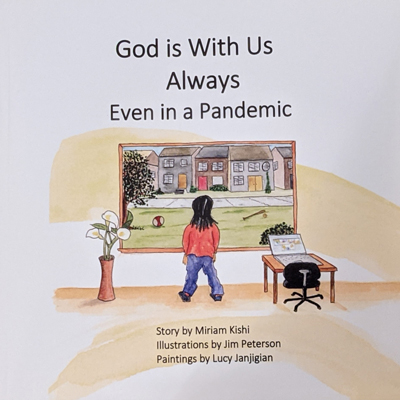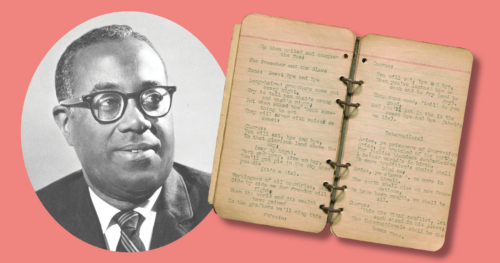Presbyterian border ministry leads a pilgrimage of prayer, lament, repentance and commitment at the wall
July 31, 2021

The Rev. Mark Adams, in the red hood, begins to gather participants at the U.S.-Mexico border. (Photo by Jenea Sanchez)
On a cool Arizona Sunday afternoon, mission co-workers Miriam Maldonado Escobar and the Rev. Mark Adams gathered with group of Christians on the border between Agua Prieta, Mexico, and Douglas, Arizona, for a prayer pilgrimage in solidarity with the “Not Another Foot” movement to call for an end of the massive border wall spanning the entire Southern border of the United States.
“We come here today with groups all along the border who are calling out ‘not another foot,’ a call to halt the continued destruction of God’s Creation,” said Adams. “At this border between two nations we come together as a common humanity to join our voices and to commit ourselves to working for the day when walls will not divide us and where borders will be places of encounter and not division.”
While some physically gathered at the border, a larger group from different faith traditions, different places and different perspectives gathered by Zoom to participate in the first of three stops of prayer and reflection.
The gathering marked the end of President Joseph Biden’s first week in office, where one of his first official acts was to pause construction of the U.S.-Mexico border wall and review its contracts and funding. The order terminated the national emergency for the Southern border that President Donald Trump issued on February 15, 2019.
After a reading of Scripture, Jocabed Gallegos, Mexican coordinator of global partner Frontera de Cristo, where she works with Maldonado Escobar and Adams, offered a reflection. She moved to Agua Prieta in 1990 when the border was a very different place. Her friends sometimes crossed to go to the swimming pool in Douglas without going through the port of entry. Many families she knew would cross to go to the only mega grocery store in the area to shop. When border patrol agents stopped them, the agents would sometimes give them a lift to the store and even wait to drive them back if they had the time.
A few poles and some barbed wire were the only things that divided the two communities.
“When we started having this wall imposed on us, the relationship between our two communities changed,” she said. “People started to fear what was on the other side and the harmony that existed between our two communities changed with it. The policies became harsher and we started seeing more and more people hurt. Coyotes began charging exorbitant amounts of money to carry people across this new border. Migration policies changed. More and more pain came to this valley, but God calls us to tear down borders in the name of the Divine.”
Gallegos challenged those assembled to love and respect God’s Creation. She said construction of the physical wall also represented the destruction of Creation. “When we join together as brothers and sisters in Christ, we are saying we want peace and justice and we want to establish the bonds of unity that have been torn apart,” Gallegos said.
Having hosted many U.S. groups before the pandemic, Gallegos was reminded of someone who had asked if she thought it was possible that the wall would ever be demolished. Another woman in her group said, “That’s what we used to say about the Berlin Wall and we saw it fall.” She said, “Whether it’s us or those who come behind us, we must take steps to make sure there is harmony among us.”
After songs and prayer, the group journeyed 35 miles along the border road, making stops for prayer and reflection at Silver Creek Mile, at the boundary of the San Bernardino Wildlife Refuge in Arizona and the final stop in Guadalupe Canyon, where a 100-foot-deep gash has been cut into the rugged mountain in order to put a 30-foot fence in it. The service concluded with participants committing to work for the restoration of God’s Creation.
Anna Valer Clark, founder of the Cuenca Los Ojos Foundation, reflected on restoration. “The work we have done has started the water flowing in the streams again, and the animals have begun to find this water,” Valer Clark said.
Kathy Melvin, Director of Mission Communications, Presbyterian Mission Agency
Let us join in prayer for:
PC(USA) Agencies’ Staff
Susan Reimann, Board of Pensions
Martha Reisner, Board of Pensions
Let us pray
Gracious God, we thank you for the opportunity to share your love in real and tangible ways with our brothers and sisters. Amen.


 Inspired by their grandchildren, three friends and members of
Inspired by their grandchildren, three friends and members of 



 Here are some interesting statistics that you might not know: In 2018, a Centers for Disease Control report revealed that one in four U.S. adults — 61 million — had a disability. According to the Collaborative on Faith and Disability, 84% of people with disabilities claim a faith tradition that is important to them. Yet only 10% of faith communities do any congregation-wide disability awareness. This was before the pandemic. Now in a time of digital worship, Bible studies and meetings, being part of a faith community can be more challenging for those living with a disability.
Here are some interesting statistics that you might not know: In 2018, a Centers for Disease Control report revealed that one in four U.S. adults — 61 million — had a disability. According to the Collaborative on Faith and Disability, 84% of people with disabilities claim a faith tradition that is important to them. Yet only 10% of faith communities do any congregation-wide disability awareness. This was before the pandemic. Now in a time of digital worship, Bible studies and meetings, being part of a faith community can be more challenging for those living with a disability.